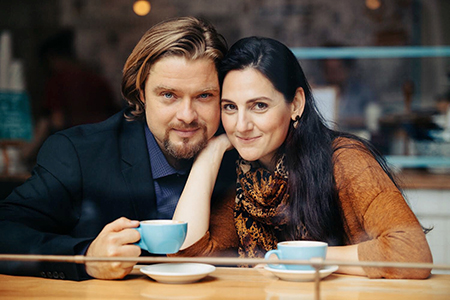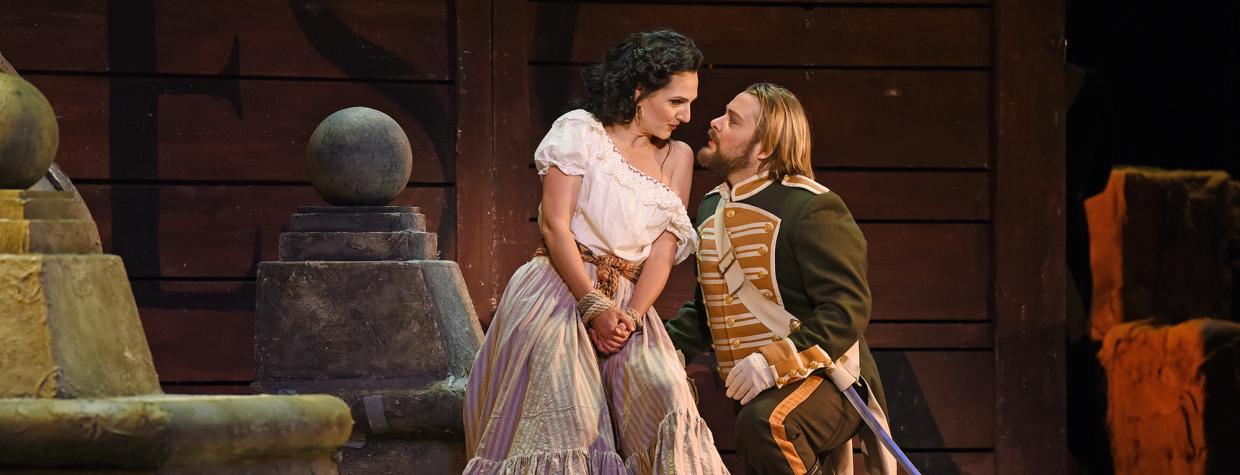In 2016, Russian-born tenor Viktor Antipenko and Israeli-born mezzo-soprano Maya Lahyani met while performing Georges Bizet’s Carmen at Opera Las Vegas. As classically trained opera singers with strong personalities, Antipenko and Lahyani clashed at first. But as rehearsals for the show progressed, what began as a challenging professional relationship led to onstage magic and an unexpected romance.
The now-married, New York-based couple recently had the opportunity to reprise their roles of Don José and Carmen in Arizona Opera’s latest production of Carmen. We caught up with Antipenko and Lahyani to hear more about their story and what it was like to work together again on the show that brought them together. (This Q&A has been edited for clarity and length.)
Tell us a little about yourselves.
Maya Lahyani: I’m a mezzo-soprano, and I started my career in New York and then San Francisco. I’m a mother of two, and I’m married to this tenor.
Viktor Antipenko: I originally studied at Saint Petersburg Conservatory as a chorale conductor, but at the same time, I started working in the Mariinsky Theatre. I was not even the age of 18 when I started my journey in the opera world. Later on, I studied at the Academy of Vocal Arts in Philadelphia with Bill Schuman. At some point, I met this girl, and here I am, with our two beautiful daughters.
For those who aren’t familiar, tell us about Carmen.
ML: Carmen is one of the most popular operas that exists. I think even non-operagoers are familiar with a lot of the tunes, because it’s used very often in movies and commercials — it's very popular. It's a really fun show. It's very engaging. The story is very dramatic. There's love, jealousy, anger and death. It's about a strong, independent woman — which I love in particular. I think it's very fitting to things that are happening in the world today, even though it was written a long, long time ago.
What are some of the themes seen throughout the show?
ML: It touches strongly on the themes of freedom, jealousy and love. It follows Carmen and Don José, two individuals with very different backgrounds, who meet each other and have this amazing spark, but they're really wrong for each other for many reasons. They can’t deny this attraction, which I feel is a theme that anyone can relate to. Carmen is a very fascinating individual. She's super charismatic. She's super smart. She's very intuitive. She can read people very well, but she's also very moody. So, that creates a lot of excitement in her encounters.
VA: I believe José is not as complex of a character; however, he finds himself in a very difficult circumstance because he has a lot of moral obligations to his mother. There is Micaëla, who was seen by his mom as his future wife, and the sudden appearance of Carmen just breaks his life and all of his dreams. He's also a very honest man. His own beliefs are very important to him. This chain of events leads him through the opera. This whole chain is very interesting, because we see what can happen to a pretty simple, straightforward man, and where the path leads him as he meets certain people.
What made this production unique?
ML: It's a pretty traditional opera, so it's very grand and very beautiful. The sets are gorgeous; the costumes are gorgeous. We have a really wonderful cast of young singers who are wonderful singers, but also wonderful singing actors. We have a beautiful woman director who made this show really, really wonderful.
VA: It's an absolutely beautiful production. We have an amazing conductor, and the orchestra plays beautifully. It's also a version of the opera with recitative instead of spoken dialogues, which I think for some people is easier to accept because it’s a musical [from] beginning to end — it's not interrupted by the sometimes quite long dialogues. We also have new people who are infusing new ideas. So, there is always a different outcome, even if we’ve done the show many times.

What was it like working together and reprising your roles as a real-life couple?
ML: We’re working together again in roles that we've done before, but we are different people than who we were, and we are also husband and wife now, not strangers. So, I think it's completely different. Yes, we sing the same roles in the same opera, but we are different now. I think we are able to translate that in our roles and create something so special and exciting. People don't need to know we are married, but I think they’ll sense a kind of chemistry and a willingness to really go for it.
What was your favorite part of working on the show?
ML: With the pandemic, for two years, our industry got hit very hard and we lost all work. So, in general, just working again is amazing. For us, our work is not just our job, it's our identity. This pandemic stripped us of our identity for way too long. It's kind of like a marathon runner who couldn't run for a while. Going back to it, we were very nervous and anxious about it, but I think we were both so pleased to discover how enjoyable it is.
If there is anything that we've learned in the past two years with the lack of the arts, it was proven that what sustained people through this pandemic was actually all those things. I hope that people will come and feel the need to experience live art again. There's something so magical about the theater. What you hear is actually the sound that comes out of our mouth — we are not amplified. This is really soul to soul: the soul that is projecting on stage, and the soul that is receiving in the hall. I feel in this modern world there's less and less of those encounters, so I hope people will still seek out those encounters, because that's what makes us human.

